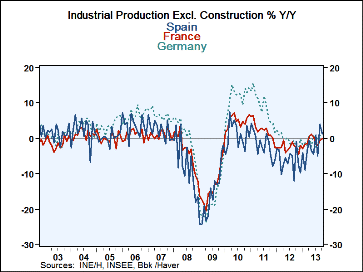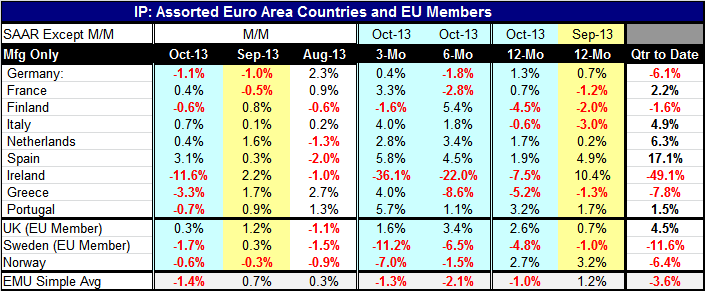 Global| Dec 10 2013
Global| Dec 10 2013EMU Industrial Production Is Generally Recovering
Summary
Industrial production in the euro zone may have hit a bit of a rocky start in October as five of the nine early-reporting EMU countries show drops in industrial production in October. Of these only Germany shows back-to-back drops in [...]
 Industrial production in the euro zone may have hit a bit of a rocky start in October as five of the nine early-reporting EMU countries show drops in industrial production in October. Of these only Germany shows back-to-back drops in its manufacturing production. Turning to broader trends, the three-month growth rates show declines only in Finland and Ireland among EMU members. Only four EMU members show output declines over six-months. Ireland shows declines over three-months, six-months, and 12-months. It is alone in showing declines over all of these horizons. However, Finland, Italy and Greece also post declines in their manufacturing industrial production over 12-months.
Industrial production in the euro zone may have hit a bit of a rocky start in October as five of the nine early-reporting EMU countries show drops in industrial production in October. Of these only Germany shows back-to-back drops in its manufacturing production. Turning to broader trends, the three-month growth rates show declines only in Finland and Ireland among EMU members. Only four EMU members show output declines over six-months. Ireland shows declines over three-months, six-months, and 12-months. It is alone in showing declines over all of these horizons. However, Finland, Italy and Greece also post declines in their manufacturing industrial production over 12-months.
Despite the presence of more negative rates of growth in October, the euro zone's growth rate still appears to be on an upswing. Only Ireland shows negative growth rates with progressive deterioration over 3-months, 6-months and 12-months. Apart from Ireland, only Finland has a negative rate of growth in output over the last three months. Italy and Spain show progressively stronger growth in manufacturing output over that horizon. On balance the rest of the early reporters show firm or recovering trends over the last 3 months and six months.
Except for the UK where IP growth has been steady, the non-EMU member early reporters in the table show encroaching weakness. Sweden shows progressively weaker with negative growth rates from 12-mo to 6-mo to 3-mo. Norway shows progressive slippage as well over that same period.
In the quarter-to-date five EMU members show output increasing while four show declines. The UK shows strong growth in the quarter-to-date while Sweden and Norway show sizeable output declines.
EMU's growth still seems to be on track. Growth is not usually and one-way uninterrupted act. This sort of backing and filling is normal especially for IP which is monthly and is more volatile than GDP. We also have PMI indices that continue to point higher. Most euro zone metrics are still pointing to expansion.
The setback in German IP reported earlier this week was a surprise. But it is not a lethal development. There may be some sense that the pace of growth in EMU is slowing. It may also be that we are just seeing some temporarily weak numbers. This is not the time to expect EMU to slow from any natural causes. Yet the world economy is still lacking demand and many economies are still struggling. The mostly likely interpretation is that EMU still has growth in gear. Among the countries in EMU with growth setbacks this month only Germany had been steady although Finland's setback is a bit of a surprise. But the output drops for Ireland, Greece and Portugal should not be viewed as any surprise at all. On balance the EMU expansion still seems to be on track.

Robert Brusca
AuthorMore in Author Profile »Robert A. Brusca is Chief Economist of Fact and Opinion Economics, a consulting firm he founded in Manhattan. He has been an economist on Wall Street for over 25 years. He has visited central banking and large institutional clients in over 30 countries in his career as an economist. Mr. Brusca was a Divisional Research Chief at the Federal Reserve Bank of NY (Chief of the International Financial markets Division), a Fed Watcher at Irving Trust and Chief Economist at Nikko Securities International. He is widely quoted and appears in various media. Mr. Brusca holds an MA and Ph.D. in economics from Michigan State University and a BA in Economics from the University of Michigan. His research pursues his strong interests in non aligned policy economics as well as international economics. FAO Economics’ research targets investors to assist them in making better investment decisions in stocks, bonds and in a variety of international assets. The company does not manage money and has no conflicts in giving economic advice.
More Economy in Brief
 Global| Feb 05 2026
Global| Feb 05 2026Charts of the Week: Balanced Policy, Resilient Data and AI Narratives
by:Andrew Cates






